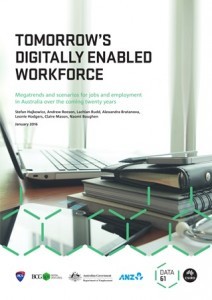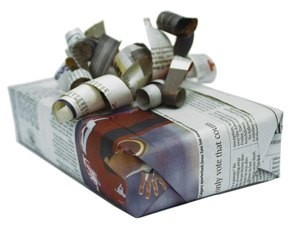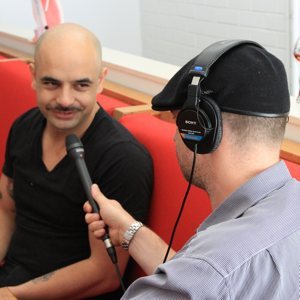Steven Lewis's Blog, page 19
June 6, 2016
Want to write better? Pick a better tune
When a client said he wanted the copy on his fitness website to have a Japanese sparseness, I knew what I had to do to get the tone right.
It’s something that will help you with your writing as well. This week’s video explains what I do to hit different tones and moods in my writing.
If you set your own writing to music, let us all know in the comments section of the blog post.
I’d love to hear how it works for you. What’s on your playlist? What music works for what kind of writing for you?
And if you feel like doing us a big favour, sharing our posts with your social networks is a huge help in getting the word out. It’s always appreciated. All you have to do is click one (or two!) of the sharing buttons below.
(If you want to see the client’s site that called for sparseness, it’s Miyagi.Fitness.)
Transcript
STEVEN LEWIS: One of my favourite copywriting tips is choose the music you listen to when you’re writing, carefully. When I was writing this site for a fitness company, I know they’re very influenced by Japanese thinking.They wanted that to come across in the language, so I got onto Spotify. I found a playlist of traditional Japanese flute music. That’s what I listened to while I wrote everything that’s on this website.
If you want to experiment with that before you actually write anything, try getting a slideshow of pictures of something that’s meaningful to you, and set that slideshow to some light classical music. Then, set that slideshow to some rock ‘n’ roll or something else. You’ll find that you look at the pictures in a completely different way because of the music that plays.
Give it a go. Choose your playlist carefully next time you have something to write. Let me know what you choose and what difference it made to you…
The post Want to write better? Pick a better tune appeared first on Taleist.
May 30, 2016
What’s the opposite of wasting words?
There’s no point writing something if you’d never say the opposite.
Passionate about customer service? Would anyone in your industry say they didn’t care about customer service? No, so you’ve wasted the little time a reader will give you with something they’d already taken for granted.
The answer is to show not tell.
If you’re really passionate about customer service, you must have some proof. Perhaps you’ve added more operators in your call centre so I never have to hear that my call is important to you (just not enough to answer it). Or you ship faster or you have a higher net promoter score…
If you don’t have anything, find a claim you can prove. It’ll be more powerful than wasting time on a given.
The post What’s the opposite of wasting words? appeared first on Taleist.
May 22, 2016
Gentle listening – a tip for writers
Last week I heard writer Felicity McLean speak on a panel at the Sydney Writers’ Festival. She wrote Leisel Jones’ autobiography. (I know you can’t write someone else’s autobiography, but this was a panel on ghostwriting.)
Leisel planned a suicide attempt down to pricing the cost of a body bag and the cost of shipping it to Queensland from Spain, where she was going to do it. Ask how you talk to someone about that, Felicity used the phrase “gentle listening”.
Most of us who write for other people won’t touch on anything as delicate as that, but it was a reminder that good communication, when you’re writing on behalf of someone else, is about listening as much as writing.
(Forgive the sunglasses, but the sun was setting fiercely and if I turned the other way I was just a silhouette.)
The post Gentle listening – a tip for writers appeared first on Taleist.
April 28, 2016
3 things you must know before you forget about your website for another week
 Our website bootcamp is a four week program. Just an hour a week to transform your lazy website into a dynamic sales tool
Our website bootcamp is a four week program. Just an hour a week to transform your lazy website into a dynamic sales toolEvery week I talk to business owners who’ve had “do something about website” on their to-do list for ages, sometimes for years. But they’re too busy, they’re confused about the options, or they don’t know where to start.
Before you push your website down your to-do list for another week, here are a few things you should think about.
1. Your competitors are setting customer expectations
If everyone in your field has a rubbish website, you might not be losing too much business if yours isn’t great either. But if their websites are working properly, they’ll be siphoning off business that could be yours.
2. You’re not making the first impression on your potential customers, your website is
Your website is often the first thing people see of your business. That’s true whether your traffic comes in cold from Google or people have heard about you and go to your website to check you out before calling.
If your website is tired, unfocused and not doing its job well, that’s how your business will come across.
3. Your website should be a constant source of new business
A good website moves visitors along a path from browser to buyer before you’ve even met them. It does this by:
Working to a plan — you know what your website can do and you’ve set it up to do that efficiently
Educating visitors — not everyone who visits your site will know enough to buy from you. You have to educate them so they can buy.
Getting their details — Why do the best websites work so hard to get your email address? Because email marketing is as powerful as it gets.
Good news! You can put off fixing up your website a bit longer
We’ve got a great excuse to put off fixing up your website a little longer.
On 26 May we’re starting a four-week bootcamp for your website.
All the details are here.
This online bootcamp will give you the knowledge and tools you need to kick your lazy website back into shape.
It takes just an hour-a-week for four weeks.
These are four live webinars with online course materials led by a content expert breaking it down for you into simple chunks:
Energise your website with a plan. Give it goals and make it work as it should.
Learn how to use your website to build a relationship with visitors
Find out how to turn those visitors into customers
Learn how you can use your website to constantly improve your marketing and even test new products before investing in them
All you need is a computer, an internet connection and to set aside an hour a week. Click here to find out more.
Your website can be the sales engine you deserve
Four hours is all it takes to get your website meaning business.
The course starts on 26 May. And the investment is just $125 if you sign up before 13 May.
Click here to make a commitment to finally getting your website off your to-do list
The post 3 things you must know before you forget about your website for another week appeared first on Taleist.
April 13, 2016
Your customers aren’t as smart as you think [Free webinar]
 Your customers need more help from your website content than you’re probably giving them.
Your customers need more help from your website content than you’re probably giving them.First thing yesterday, I gave a presentation to a business group. It was called Your customers aren’t as smart as you think — 3 things your website should be doing but probably isn’t.
It went over so well that one person emailed me that afternoon to tell me she’d gone straight back to her office to start fixing her website.
Because it went over so well, I’m running the presentation next week as a 15-minute webinar and I think you should come.
Is this you?
Are you making one (or more) of three basic but expensive mistakes with your website? Most people are.
Have you spent time and money on your website and would like it to create more business for you?
Are you tired of hour-long webinars that are more sales pitch than information? Us, too.
Just 15 minutes?
We’re just as sick of over-long, salesy webinars as you are. We’re a content agency, so we’re all about content.
That’s why we’re offering an injection of simple advice you can act on immediately to make your website more effective at turning leads into customers. No sales pitch.
And it’s happening at lunchtime, so grab a sandwich, sit back and watch it from your desk, iPhone or iPad.
Book now for Wednesday 27 April, 1-1.15pm (AEST).
Webinar presented by…
Steven Lewis built his first website for a client in 1994, when there were fewer than 10,000 websites in the world. In 2004, he started one of Australia’s first social media agencies, two years before Twitter was born and before Facebook was open to the public. Since then he has consulted to companies and organisations like Westpac, IAG, Pfizer, AMP and Tourism Tasmania. He has a particular passion for helping small businesses be heard online.
Steven has spoken at conferences and run courses around the world. Steven directs Taleist, a content marketing agency based in Sydney.
Sign up here: http://taleist.com/webinar-smart-customers/
The post Your customers aren’t as smart as you think [Free webinar] appeared first on Taleist.
February 29, 2016
Will online training save you from the megatrend that will eat your job?
Is there a more misleading oxymoron than “permanent employee”? The CSIRO has just reported on multiple global megatrends that create plausible scenarios in which “many — possibly most — Australian workers become portfolio workers and freelancers.” Online training, among other kinds, is going to be crucial to workers wanting to stay relevant.
 Fewer of us will have one employer in the future. Instead we’ll be “portfolio” workers.
Fewer of us will have one employer in the future. Instead we’ll be “portfolio” workers.When I started my last job working for someone else, I used to tell my colleagues I was still self-employed as far as I was concerned, and so were they. We might have just one client, but we had to keep the client happy by staying relevant or else. You don’t understand, they’d tell me. We’re permanent.
It didn’t bother them that the marketing of their jobs as “permanent” was done by the same people who called them human “resources” or, somehow worse, “capital”. The sheer volume of euphemisms for “you’re fired” should have been another clue — redundancy, retrenchment, restructuring, rightsizing, and that’s just the Rs. What are all these words for if everyone’s permanent?
Aside from the risk of being fired when shareholders aren’t making as much as they think they should, what happens if you don’t keep training to make sure your skills are current? If you’re a horse and cart driver, your employer might retrain you when it decides to replace the horse with a van. But would you bet your mortgage on it?
Tomorrow’s Digitally Enabled Workforce from the CSIRO has reports on megatrends that will affect Australian workers. It’s encouraging reading for people with an entrepreneurial bent, but a grim read for anyone still clinging to the illusion of permanence.
The same people could have written Deloitte Access Economics’ Future Inc report, which also came out recently.
Both reports reference the importance of online training, among other forms, to keep us relevant.
Get ready for portfolio working
A third of working Americans are independent workers. They freelance, they contract, they mix the two — “portfolio work”. It’s a global megatrend, says the CSIRO, which means it’s going to happen here.
“The ideal job within a large organisation may not be awaiting an increasing number of future job seekers. This means individuals will need to create their own job. This will require entrepreneurial skills and aptitudes.” — Tomorrow’s Digitally Enabled Workforce
Train and re-train, whether online or otherwise
We’re going to have to be ready — if we’re not already — for lifelong learning. And we’re all going to have to be digitally literate.
That might not sound like a leap to you as you surf LinkedIn, but I’ve worked with highly capable people who approached their computers as they might an unexploded IED.
Formal education will remain important, both reports find, but online education will be faster and more responsive to filling gaps in our knowledge.
Everyone’s an entrepreneur
 The CSIRO found several plausible scenarios in which “many — possibly most — Australian workers become portfolio workers and freelancers.”
The CSIRO found several plausible scenarios in which “many — possibly most — Australian workers become portfolio workers and freelancers.”A CIO told me once that he couldn’t believe how complacent his mainframe team was. They knew mainframe computing was going the way of the horse and cart, but they were doing nothing to learn new skills. It appeared they were expecting to stay at their desks after the mainframes were eventually retired, waiting for the company to pay for them to learn something else. They were in for a surprise.
“In tomorrow’s job market adaptability, resilience, buoyancy and entrepreneurial capabilities are of growing importance… Workers will need the capability to handle a career dead-end (or job loss) and create their own job in another space.” — Tomorrow’s Digitally Enabled Workforce
But you and I are halfway there (if you’re on LinkedIn, too)
The CSIRO gives snaps to anyone on LinkedIn already:
“Additionally, the once separate domains of professionals such as journalists, scientists, business owners and the general public are increasingly becoming more and more interconnected, with social media enabling immediate and significant connections – connections that may previously have been considered beyond conventional reach. An excellent example of such interconnectedness is LinkedIn.” — Tomorrow’s Digitally Enabled Workforce
It’s great to be independent (88% favourable)
According to the CSIRO, the number of independent contractors in Australia is around 1 million. Thirty-two per cent of them say demand for their services is growing, and 88 per cent would continue with freelancing even if they were offered a traditional full-time position.
But the competition just got global
Glass half full or half empty? Tomorrow’s freelancers and portfolio workers are going to be competing on a global scale.
“The rise of the “virtual global worker… means that employees in… Australia will increasingly need to compete against talent from other countries in the future, while allowing Australian companies to access a much larger pool of global talent and putting downward pressure on wages.” — Future Inc.
The market just got a hell of a lot bigger, but so did the competition. Keeping up your training, taking online courses, reading blogs, listening to podcasts… it’s all going to be crucial
The answer?
Keeping current. Training. Always learning.
I’ve worked building websites, as a journalist, in PR, as a social media consultant, and producing audio and video. Mostly I’ve taught myself and moved into new businesses as I’ve learned.
Along the way, I’ve paid for training, read countless books, put in thousands of hours practising and figuring things out. And yes, I’ve been lucky enough to have some training from employers, but I’ve never counted on it.
If I had, I’d probably still be working on the door of a nightclub.
What about you? What’s your plan?
The post Will online training save you from the megatrend that will eat your job? appeared first on Taleist.
November 8, 2015
13 Ways to Get Your Business in the Media This Christmas
A juicy piece of free press promoting your business could be the Christmas present you give yourself this year.
 At this time of year, every journalist needs good stories with a Christmas connection. Find one and the free PR is yours.
At this time of year, every journalist needs good stories with a Christmas connection. Find one and the free PR is yours.One of the best times to get free media coverage for your business is when journalists are fighting for fresh stories on a well-worked theme.
Christmas is definitely one of those times.
Every section of the newspaper needs new stories with a Christmas theme (or new takes on the same stories you see every Christmas).
Follow the lead of the big brands
That’s why big brands do everything they can to help journalists out at this time of year.
 Aldi’s novelty crisp flavour was all about generating Christmas PR, not turning the public onto gin-flavoured potatoes
Aldi’s novelty crisp flavour was all about generating Christmas PR, not turning the public onto gin-flavoured potatoesAldi, for instance, released a new flavour of crisps just for Christmas: gin and tonic. Were they expecting to make millions from a novelty potato chip? No, but they were expecting to get some PR out of it. That’s why every newsroom in the country would have received a box of gin and tonic crisps this year.
Journalists foraging for something with a Christmas angle could review the crisps or include them in a round-up of cool and unusual things to eat this Christmas.
And every time the snacks got a mention, so did Aldi. The exercise wasn’t about selling the snacks: it was about reminding people that Aldi was stocked and ready for their Christmas food shopping.
How can you help a journalist and get yourself some free press at the same time?
You don’t have to be a big brand to help a journalist out this Christmas. You just have to think about where your business intersects with the spirit of Christmas and what people are doing at this time of year.
So what are people doing at Christmas?
They’re thinking of each other
They’re overeating and overspending
They’re taking holiday
They’re hosting guests
They’re buying presents
They’re reviewing the year gone by
They’re partying
They’re eating out
They’re thinking about the future
They’re…
With that in mind, here are some thought starters to get you thinking about how you could get your business some free press this Christmas.
1. What’s hot this Christmas?
What’s happening right now because it’s Christmas or the end of the year?
 There’s a must-have toy every Christmas, but something is hot this time of year, whatever your business
There’s a must-have toy every Christmas, but something is hot this time of year, whatever your businessWhat’s hot? What’s everyone doing differently this year from this time last year? What does everyone want for Christmas? It’s not just about gifts.
If it’s bonus season, what can you say about how that’s different this year?
Are you a real estate agent with something to say about how this Christmas is affecting the property market?
Is Christmas a good time to get a bargain in your area of business (or is it is a bad time)?
2. Seasonal tasks: business
What are you expert in that businesses should be doing at Christmas?
Can you put together some Christmas tips based on your insider knowledge of some area of business?
Is it a good time for maintenance? For planning? To review the year? To recruit? To…?
Is there something businesses should do at Christmas that they might fail to do?
Newspapers love to sound a warning or just to be helpful.
3. Seasonal tasks: domestic
 What needs doing around the house at this time of year?
What needs doing around the house at this time of year?Christmas is a frantic time on the domestic front. People love anyone who does the thinking for them on how to do things better, faster, cheaper….
What should people be thinking about getting done at this time of year?
Do you know about planning for a Christmas party?
Should people be getting their finances in order?
Should they be thinking about their health?
Doing some work on the house?
Basically, what does your business do that you could give people advice about through the lens of Christmas? If you don’t have enough on your own, what complementary businesses could you work with to put together an idea for a story?
4. The year in review
Take a moment to look back over the last year. What insights about the last 12 months can you give a journalist covering your industry or your customers?
How are things different now from the beginning of the year?
Is there something you can make an observation about? How has this year been for businesses in your industry or your customers?
What have you noticed?
How was this year different from last year?
 Look into the future and what do you see? The media loves predications for the year ahead.
Look into the future and what do you see? The media loves predications for the year ahead.5. The year ahead
The only thing newspapers like better than a year-in-review piece is a predictions piece. What predictions for the next 12 months can you make for your industry or the customers it serves?
6. New Year’s resolutions
What New Year’s resolutions should your customers be making? For instance:
A financial planner could give tips for growing wealth over the next 12 months
A plant nursery could give advice for gardeners be resolving to do better by their gardens in the coming year
A productivity expert could talk about how to get more out of next year than this year
A health expert could talk about how to achieve your health goals in the next 12 months
Every business can advise customers on getting more out of the new year. What’s your advice?
7. A guide to having the best Christmas
Most business can also give advice on having a great Christmas.
Do you sell food? (Give tips for cooking a great Christmas meal.)
Do you give relationship advice? (Tell families how they can get through Christmas without arguing.)
It’s school holidays. (Give ideas for entertaining the kids.)
In the health business? (Tell us how we can avoid overeating or deal with the consequences if we do.)
Are you in building maintenance? (How can your customers avoid having their Christmases ruined by being called into deal with a burst pipe or other emergency they could have avoided?)
If you think you don’t have “Christmas” advice you could give, think harder.
 Everybody’s looking for something at Christmas. Help them find it and you could get some great free PR
Everybody’s looking for something at Christmas. Help them find it and you could get some great free PR8. Where to find…
Christmas is a time of searching, whether it’s for the perfect gift or inner harmony.
What can you tell people about where to find whatever it is they might be looking for?
9. The best…
Christmas in the media is all about giving advice. And advice on where to find the best x or how to do the best y is always popular. Think about:
The best places to go
The best ways to do something
The best things to buy
The best ways to avoid something
Stuck? On a piece of paper write down “The 10 best ways to this Christmas.” Give yourself 60 seconds and just write down everything that comes to mind that’s relevant to your business.
10. Have a competition
Is there a fun competition you could run with your customers. Answer a piece of Christmas trivia correctly and get a 10% discount…
Local media love stories about local businesses doing something different and topical. Quirky is good.
11. Catch the eye
All media, but especially local media, needs eye-catching photos. Elaborate, fun or inventive decorations or costumes make great pictures, and great photographs of local people doing things locally make people read their local papers.
A cheese shop with a nativity scene made entirely of brie…
An office that turns its windows into Christmas display worthy of Selfridges…
12. Be charitable
Christmas is the season of giving. Are you supporting a particular charity this year? Just donating won’t interest the newspaper. You will need a story to go with it.
Is the charity close to your heart for a particular reason?
Is it tied to your type of business?
Are you giving your customers a chance to get involved?
 Some Christmas story angles are as old as Santa himself. They make getting media coverage for yourself that bit easier
Some Christmas story angles are as old as Santa himself. They make getting media coverage for yourself that bit easier13. Recycle someone else’s idea
If you don’t have an idea yet, don’t worry. Stories are recycled every Christmas, and those are the easiest ideas to pitch to journalists. If they liked them last Christmas, why wouldn’t they like them again?
This Christmas you’ll see advice on losing weight, being a great host, keeping the kids off the Xbox, doing year-end tasks and all the other stories you saw last Christmas and the 40 Christmases before it.
Seasonal stories are perennial. Newspapers aren’t going to steer clear of turkey recipes just because they ran them last year.
Use Google to search for what stories were written last year that featured people from your industry then pitch your take on those topics.
What now?
 A great press release takes your story, wraps up all the elements and ties it off in a bow for the journalist
A great press release takes your story, wraps up all the elements and ties it off in a bow for the journalistSo you’ve had a good idea, it’s time to let the media know. The easiest way to do this is with a press release.
A press release is a tried and true way of writing up your story suggestion. It puts your idea in such a way that the journalist can picture the story you’re pitching and how she might write it up.
Press releases contain the core of the story, all the important facts and the contact details of the people involved.
Download our free quick-start guide to writing a killer press release
 Get your story idea out to the media with our free guide to writing a press release
Get your story idea out to the media with our free guide to writing a press releaseIt’s early but here’s our Christmas present to you…
To get you started, we’ve put together a flowchart for writing a killer press release.
Taleist director Steven Lewis has written press releases for everyone from small businesses to Fortune 50 tech companies.
Follow his simple process to produce a perfect press release.
Just enter your email below and we’ll send it straight to your inbox.
Enter your email address so we can send you the flowchart
The post 13 Ways to Get Your Business in the Media This Christmas appeared first on Taleist.
September 24, 2015
Media training tip: How to know if you’re giving a good interview
You’ve successfully pitched a journalist that you’re the person to talk to for a story. The interview has begun. How do you know if you’re doing a good job?
Fortunately, it’s pretty easy to tell whether you’re giving a good media interview because journalists take notes. Our memories are no better than yours. In fact, they’re probably made worse by the fact that we flit from subject to subject. One minute we’re interviewing someone about the latest stock market fluctuations, the next we’re looking at trends in gold mining. Also, we might be interviewing you for a story we’re not going to write for days or weeks.
 Steven Lewis interviewing Adriano Zumbo. (Of course with audio, you won’t see any notetaking, so keep it short and sweet.)
Steven Lewis interviewing Adriano Zumbo. (Of course with audio, you won’t see any notetaking, so keep it short and sweet.)Because we don’t know when we’re speaking to you exactly what we need for our story, we tend to write everything down. That makes for one very easy clue that what you’re saying isn’t making the cut: we stop writing.
If you’re in the same room, you’ll see the journalist taking notes. If you’re on the phone, chances are you’ll be able to hear the journalist typing.
When the notetaking or the typing stops, that means the journalist is 100 percent certain that what you’re saying isn’t going in the story.
At that point, you need to wind it up. If you’re wrong, the journalist can ask you to carry on. More likely, she’ll ask another question, refocussing the interview on what she actually wants to know.
Pausing to give her that opportunity is good for you both. If she’s not writing it down, you’re wasting your breath anyway. Letting her direct you where she wants to go increases your chance of appearing in the finished article.
Want more great tips for doing PR without paying an expensive consultant? Click here.
The post Media training tip: How to know if you’re giving a good interview appeared first on Taleist.
September 20, 2015
Media Training Tip: The Irresistible Product Mention
When you’re giving an interview to a journalist and the interview isn’t specifically about the product or service you’re promoting, you need to find a way to work it into the interview in a way that makes it irresistible, i.e. you’ve said it in such a way that the journalist would have a hard time leaving it out of the story. Here’s one example…
Video transcript
I saw a great example this weekend of the irresistible product mention. If you want to use the media to stand out and grow your business, it’s worth knowing about the technique.
When you’re being interviewed, the journalist isn’t obliged to mention the things you might want her to… unless the interview is specifically about the thing you’re promoting… like when Hollywood stars give interviews around the time their films come out.
The example I saw this weekend is from this profile of Russel and Kate Howcroft. It’s a profile of the husband and wife. It’s not an article about Russel’s new book, but undoubtedly he was hoping it would get a mention in the piece.
Kate mentions the name of the book in the interview then says, “Considering the way he walks, it’s kind of cute that it’s published by Penguin.”
The journalist writing the piece couldn’t resist including that bit of cheeky colour. I would have included it too. But there’s no way to include the funny bit about the way Russel walks without mentioning the book because the reference to Penguin doesn’t make sense otherwise.
Maybe Kate is naturally colourful. But Russel is in advertising, so I wouldn’t be surprised if the two of them had a couple of stories and lines rehearsed before the interview. And there’s nothing wrong with that. Unless you just like being in the media, there has to be something in it for you.
So if you’re not being interviewed specifically about the thing you want to promote, it’s worth spending a bit of time seeing if you can’t work a mention of it into something irresistible.
Want more great tips for doing PR without hiring an expensive PR consultant? Click here.
The post Media Training Tip: The Irresistible Product Mention appeared first on Taleist.
October 18, 2013
Can self-publishing ever be meaningful?
“Can self-publishing ever be meaningful?” was the question I was asked to address in a panel session on Commercialisation: the business of authorship.
The panel was part of the always interesting Australian Society of Authors‘ National Writers’ Congress this weekend. The panel also included Sandy Grant of Hardie Grant Publishing, Joel Naoum of Momentum Books, and bestselling romance author Ally Blake.
I learned plenty from their talks but their IP is their own. That, not naked egocentricity, is why I recorded only my own contribution. I did see a camera at the back of the theatre with a flashing red light, so if you’re lucky their talks will be available somewhere soon.
The kamikaze pilots of literature
Self-publishing talk video
Without further ado, if you’re interested in finding out who I think are the kamikaze pilots of literature, and a few other things about self-publishing, too, the video is here.
If you can’t see the video, click here.
Self-publishing talk audio
And there’s an audio-only version, too.
If you can’t see the player, click here.
Where the hell have I been?
I’ve not been blogging about self-publishing much for a while. My focus has moved to my speaking and training business here in Australia, which has its own smart new website. I do blog there about things that are relevant to authors, things like social media and online marketing. If you’re interested, please check it out.
New social media marketing list
The new blog has its own mailing list. You won’t get posts from that blog unless you sign up there because I don’t want to spam you! So, if you find it interesting, don’t forget to sign up for the blog.
Rate this post at: Can self-publishing ever be meaningful?
Read and comment on more great content on the Taleist self-publishing blog




